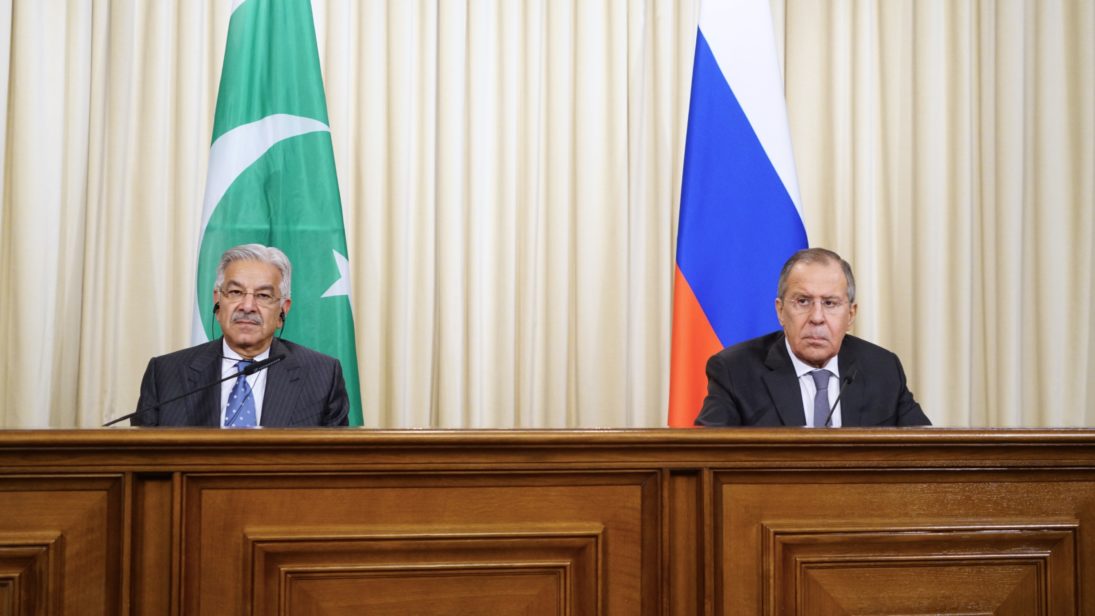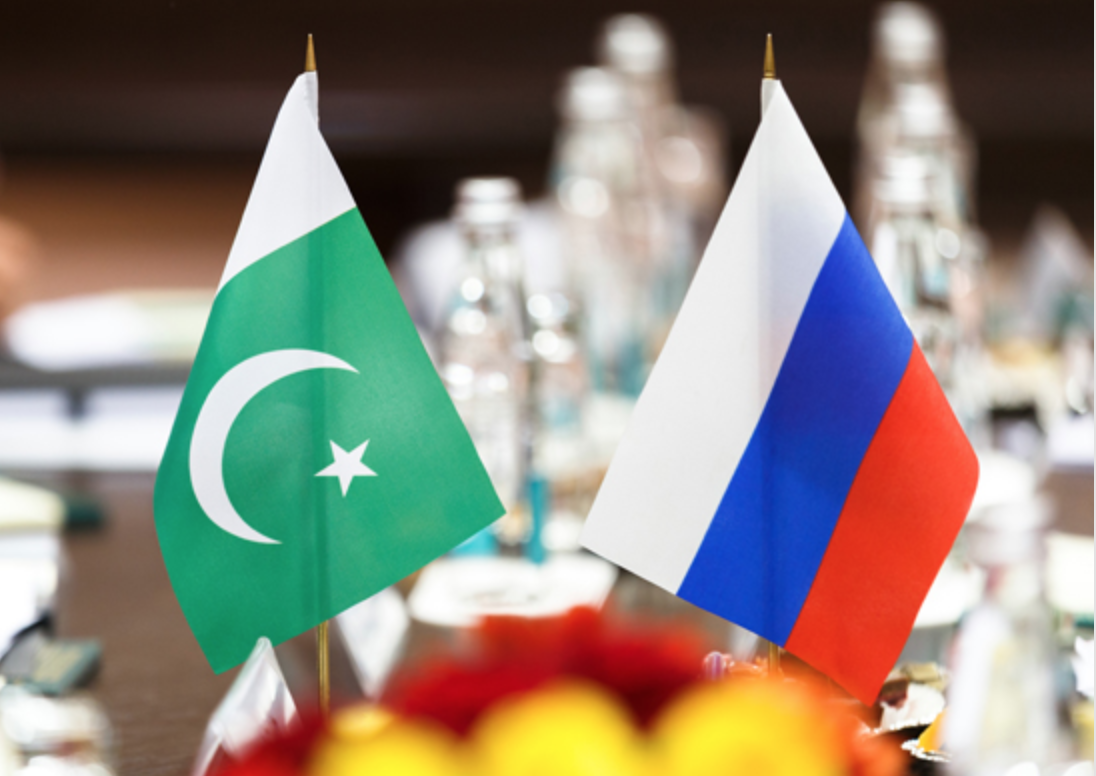
Despite being former Cold War adversaries, Pakistan and Russia are gradually building a cooperative working partnership with each other, particularly in military-to-military relations. In 2016, both countries conducted their first-ever bilateral defense exercises, which took place last year as well. Additionally, following a USD$153 million deal made in 2016, Moscow began supplying Mi-35 assault helicopters to Pakistan this April. Recent commitments made by the Kremlin to strengthen military cooperation bore fruit earlier this month, when both countries inked an agreement under which Pakistan officers will acquire military education and training in eminent military institutions in Russia.
Warming Pakistan-Russia ties are taking place at a time when Islamabad’s relations with Washington are strained. However, as yet, it does not seem that closer military cooperation between Pakistan and Russia will significantly affect the overall dynamics of Pakistan-U.S. relations. In fact, the United States could engage both countries to improve the likelihood of a positive outcome for its negotiations with the Taliban.
Russia-Pakistan Ties: Nascent and Single-Issue
Earlier this month, the United States suspended funding for an initiative that allowed Pakistani military officers to attend courses in the United States under the International Military Education and Training Program (IMET) arrangement. The program was an important component of Pakistan-U.S. military relations, serving as “a key trust-building measure” and encouraging understanding between senior officers. Pundits worry that this decision could squander whatever little goodwill remains between the estranged partners. The virtual suspension of this important training program is the latest pressure tactic employed by Washington against Islamabad, and may have played a role in the military cooperation agreement that Pakistan recently signed with Russia.
Thus far, the United States has not raised eyebrows over Pakistan’s growing ties with its erstwhile foe. However, given that Washington has documented Moscow’s assertiveness as a strategic threat, the prospects for a closer Pakistan-Russia partnership are anything but comforting for the United States. Its response could be attributed to the nascent nature of the Pakistan-Russia relationship, which so far has been limited to tactical-level cooperation like joint military exercises and provision of arms.
Unlike Pakistan’s robust relations with China, it will take time for Islamabad and Moscow to build a meaningful partnership. Apart from bitter memories of Cold War competition, Russia’s historic and continued strategic ties with India might worry Islamabad. Washington (or New Delhi, for that matter) could be perturbed if this fast-developing relationship enters into the strategic realm, as desired by Pakistan. Pakistan’s vision of a multidimensional strategic partnership is exemplified by its strong ties with Beijing, which entail increased trade and healthy diplomatic support for each other’s core concerns. Pakistan has offered Russia a strategic partnership in multiple domains like trade and education.
Besides, a strategic relationship cannot be hinged on one specific goal, and as things stand today, the newfound love between Russia and Pakistan seems to be exactly that: restricted to dismantling ISKP in Afghanistan. Earlier this year, both Russia and Pakistan planned to establish a joint military commission to fight the Islamic State-Khorasan Province (ISKP) in Afghanistan. While highlighting the importance of fighting terrorism, Russian Foreign Minister Sergey Lavrov confirmed his country’s readiness to bolster Pakistan’s counterterrorism capacities. Also, speaking in India in 2016, Russia’s special envoy to Afghanistan emphasized that the Russia-Pakistan relationship was “purely commercial,” for the sole purpose of combating ISKP in Afghanistan. The Kremlin has repeatedly called for meaningful cooperation with Islamabad to fight terrorism. As yet, it remains to be seen whether Russia and Pakistan can enter into cooperative agreements on multiple issues beyond fighting ISKP.

Engaging the Taliban through Moscow and Islamabad
Deepening Pakistan-Russia ties may not be a negative development for Washington, who could use this alignment to build a regional consensus behind its ongoing negotiations with the Taliban. Pakistan and Russia have each championed efforts to provide a political settlement to the Afghanistan conflict, and this commonality has been the major point of convergence between Islamabad and Moscow. In June, Pakistan was credited with playing a role in bringing about the Eid ceasefire between the Taliban and the Afghan government. With a view to facilitating talks with the Taliban, Moscow has tried to bring current and potential stakeholders together to find a political solution to the Afghan problem. It organized six-party talks in Moscow in February 2017 between Afghanistan, India, China, Pakistan, Russia, and Iran, and had already begun coordinating its policy in Afghanistan with Pakistan and China going back to 2013. In line with the Moscow Process, Russia has called upon all stakeholders, especially the United States, to engage in talks with the Taliban. However, recently these efforts have been marred by rejections from the United States and the Afghan government.
That said, the United States could be doing more to engage with Pakistan and Russia on the Afghan issue. While Washington has repeatedly called on Pakistan to persuade the Afghan Taliban to join peace talks, it has refused to participate in the multi-country fora organized by Russia. Along with the Afghan government, the United States decided not to participate in an upcoming meeting that was due to take place in Moscow next month, but has now been indefinitely postponed after Russia acknowledged that the peace talks should be Afghan-led. The United States has also dismissed Pakistan’s claim that Moscow may have more influence over the Taliban than Islamabad.
Regardless of whether Islamabad or Moscow wields more influence over the Taliban, the group’s agreement to partake in the now-postponed meeting indicates that the militant group sees Russia as a credible mediator, and the Taliban may deem negotiations more credible if Washington is not seen as the one calling the shots.
Simultaneous engagement with Moscow and Islamabad, particularly through the Moscow Process, could assist the United States in its negotiations with the Taliban. After welcoming the three-day Eid ceasefire between the Taliban and the Afghan government earlier this year, prominent U.S. diplomats allegedly met with Taliban officials, while Secretary of Defense James Mattis stated that peace talks with the Taliban are underway earlier this month. Working with Russia and Pakistan could help Washington constructively engage with the group, as each maintains varying degrees of influence over the Taliban. Regardless of whether Islamabad or Moscow wields more influence over the Taliban, the group’s agreement to partake in the now-postponed meeting indicates that the militant group sees Russia as a credible mediator, and the Taliban may deem negotiations more credible if Washington is not seen as the one calling the shots. Resuscitating the indefinitely-postponed Moscow Process, where Washington and Kabul’s participation is notably absent despite their stated desire to negotiate a political settlement with the Taliban, is one pathway forward for the United States should it choose to pursue this option.
At the moment, it is reasonable to assume that recent improvements in Pakistan-Russia military relations are still not very robust, and will probably not draw Washington’s attention. However, the momentum and goodwill being generated between the two former Cold War rivals could indirectly help the United States achieve its goal of peace in Afghanistan through engagement with the Afghan Taliban.
***
Image 1: МИД России via Flickr


